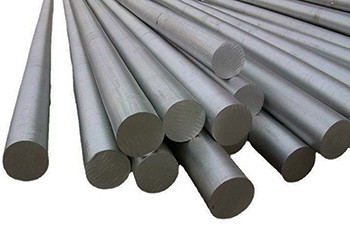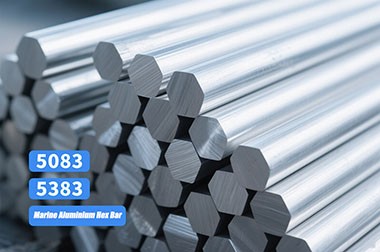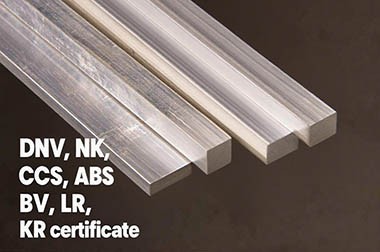5383 H321 Aluminum
5383-H321 aluminum has high strength and excellent corrosion resistance, making it suitable for high-load marine applications, especially in environments that require resistance to intergranular corrosion and exfoliation corrosion.
5383-H321 aluminum is the H321 temper of 5383 aluminum alloy, enhanced through specific strain hardening and stabilization processes to improve the material's mechanical properties. While increasing strength, it maintains good corrosion resistance. The H321 treatment ensures long-term stability of the alloy in marine environments, particularly in resisting intergranular corrosion and exfoliation corrosion.
5383-H321 aluminum is an alloy that has been enhanced through strain hardening and stabilization treatments, offering high tensile strength and yield strength. Its strength is between the annealed (O) and fully hardened (H38) states, making it suitable for high-load marine applications that require strong mechanical properties. At the same time, the H321 treatment process enhances its ability to resist intergranular corrosion and exfoliation corrosion, ensuring a longer service life in seawater and salt environments. It is ideal for use in ships, offshore platforms, and marine structures that require a balance of strength and corrosion resistance.
Characteristics of 5383-H321 Aluminum
Temper and Hardness
The H321 temper of 5383 aluminum alloy is made through strain hardening and stabilization treatments, with strength between the annealed (O) and fully hardened (H38) states, typically one-quarter of the fully hardened state’s strength.
In this process, the alloy undergoes cold working to induce strain hardening, followed by heat treatment to stabilize the alloy, thus improving its strength and durability.
Strength and Toughness
5383-H321 aluminum alloy has higher strength than the H116 temper, especially showing significant improvements in tensile strength and yield strength. This allows it to withstand higher working loads and mechanical stresses.
However, despite its higher strength, its toughness is relatively lower, making it suitable for high-load structural components that require high strength.
Resistance to Intergranular Corrosion and Exfoliation Corrosion
During the H321 treatment, the alloy’s resistance to intergranular corrosion and exfoliation corrosion is strengthened. The stabilization process effectively suppresses corrosion at grain boundaries, thus increasing the alloy's durability in marine environments.
This treatment ensures that 5383-H321 aluminum maintains good structural stability even after prolonged exposure to saltwater, humidity, and other harsh environments.
Corrosion Resistance
5383-H321 aluminum has excellent corrosion resistance, particularly excelling in seawater corrosion. Its resistance to seawater, moisture, and salt corrosion makes it an ideal material for marine engineering and shipbuilding.
Compared to other aluminum alloys, the H321 temper of 5383 aluminum alloy offers a distinct advantage in corrosion resistance, making it suitable for applications exposed to harsh environments for extended periods.
5383 H321 Aluminum Mechanical Properties
| Property | 5383-H321 Aluminum |
| Brinell Hardness | 90 |
| Elastic (Young's, Tensile) Modulus, x 10⁶ psi | 9.9 |
| Elongation at Break, % | 12 |
| Fatigue Strength, x 10³ psi | 30 |
| Poisson's Ratio | 0.33 |
| Shear Modulus, x 10⁶ psi | 3.7 |
| Shear Strength, x 10³ psi | 30 |
| Tensile Strength: Ultimate (UTS), x 10³ psi | 50 |
| Tensile Strength: Yield (Proof), x 10³ psi | 36 |
5383 H321 Aluminum Thermal Properties
| Property | 5383-H321 Aluminum |
| Latent Heat of Fusion, J/g | 390 |
| Maximum Temperature: Corrosion, °F | 150 |
| Maximum Temperature: Mechanical, °F | 400 |
| Melting Completion (Liquidus), °F | 1200 |
| Melting Onset (Solidus), °F | 1010 |
| Specific Heat Capacity, BTU/lb-°F | 0.22 |
| Thermal Conductivity, BTU/h-ft-°F | 72 |
| Thermal Expansion, µm/m-K | 24 |
5383 H321 Aluminum Electrical Properties
| Property | 5383-H321 Aluminum |
| Electrical Conductivity: Equal Volume, % IACS | 29 |
| Electrical Conductivity: Equal Weight (Specific), % IACS | 97 |
5383 H321 Aluminum Alloy Composition
| Element | Composition Range (%) |
| Aluminum (Al) | 92.0 to 95.3 |
| Magnesium (Mg) | 4.0 to 5.2 |
| Manganese (Mn) | 0.7 to 1.0 |
| Zinc (Zn) | 0.0 to 0.4 |
| Silicon (Si) | 0.0 to 0.25 |
| Chromium (Cr) | 0.0 to 0.25 |
| Iron (Fe) | 0.0 to 0.25 |
| Zirconium (Zr) | 0.0 to 0.2 |
| Copper (Cu) | 0.0 to 0.2 |
| Titanium (Ti) | 0.0 to 0.15 |
| Residuals | 0.0 to 0.15 |
5383 H321 Aluminum Applications
Due to its high strength, good corrosion resistance, and enhanced durability through stabilization treatment, 5383-H321 aluminum is widely used in marine environments that endure significant stress and high loads, especially in engineering applications that require long-term stability and high mechanical performance.
| Application | Description |
| Offshore Platforms | 5383-H321 aluminum is used in offshore platforms, especially in parts exposed to marine climates that need to withstand extreme environments and loads. These platforms often need to maintain structural stability in high salt, humidity, and fluctuating wave conditions. H321 temper aluminum alloy, with its strong corrosion resistance, is the ideal material in marine engineering for parts exposed to high mechanical stress and corrosive environments. |
| Ship Hull Frames | In shipbuilding, 5383-H321 aluminum is widely used in the manufacture of ship hull frames and ship structures. Due to its high tensile strength and yield strength, H321 aluminum alloy is suitable for components that require high strength and long-term corrosion resistance, such as the load-bearing structures and key connection parts of ships. These parts typically need to endure substantial external stresses and extreme marine environmental conditions. |
| Marine Structural Components | Due to its excellent corrosion resistance, 5383-H321 aluminum alloy is widely used in marine structural components, such as supporting structures for offshore platforms, floating structure parts, and more. These structures need to be used for long periods in harsh marine environments, facing high-strength loads and the corrosion effects of seawater, making H321 aluminum alloy the ideal choice. |
| High-Load Components | H321 aluminum alloy is widely used in the manufacture of high-load components due to its high strength and corrosion resistance, such as the foundation frames for offshore wind turbines, and critical structures in offshore oil and gas production equipment. These components often operate under extreme working conditions, needing to withstand immense pressure and strength loads, while also requiring corrosion resistance to prevent seawater from damaging the material. |
| Marine Engineering Requiring Long-Term Stability | In marine engineering projects requiring long-term stability, 5383-H321 aluminum alloy is used to manufacture components exposed to seawater for extended periods, such as marine buoys, support columns, and connection structures for offshore oil platforms. Its excellent corrosion resistance and high strength enable it to effectively withstand long-term environmental pressure, ensuring the reliability and stability of structures over time. |
5383-H321 aluminum, due to its strength and corrosion resistance, is widely used in high-load and high-stress marine environments, such as offshore platforms, ship hull frames, marine structural components, and other marine engineering parts. It is suitable for applications that require long-term durability and high mechanical performance, especially in harsh marine environments, effectively resisting seawater corrosion and mechanical wear to ensure the stability and service life of engineering structures.
Recommended for you
-
5383 marine grade aluminum plate has excellent corrosion resistance and high strength. Aluminum alloy 5383 is commonly used in shipbuilding and other maritime structures where durability and resistance to salt water corrosion are critical.
-
5383 H112 aluminum is a corrosion-resistant, medium-strength alloy with excellent formability, making it ideal for marine applications. It is also cost-effective for structural components exposed to harsh environments.
-
5383-H116 aluminum offers good corrosion resistance through specific heat treatment and cold working, making it suitable for light-load marine applications, especially for long-term use in seawater environments.
-
5383 H34 aluminum alloy is a high-strength aluminum alloy that has undergone strain hardening and stabilization treatments, offering excellent corrosion resistance and weldability. It is widely used in marine, transportation, and construction fields.
-
5383-H32 Aluminum is an aluminum alloy that has undergone strain hardening and stabilization treatment, belonging to the aluminum-magnesium alloy series. The "H32" temper indicates that the alloy has been strain-hardened through cold working and then stabilized by appropriate heat treatment, with strength lying between the annealed (O) and full-hard (H38) states.
-
5383-H111 aluminum alloy is a type of aluminum alloy, which undergoes specific heat treatment and mechanical processing to be in the H111 condition. This alloy is widely used in environments that require good corrosion resistance and moderate strength.
-
5383-O aluminum alloy is the annealed (O condition) version of 5383 aluminum. It belongs to the aluminum-magnesium alloy series and has excellent corrosion resistance, particularly outstanding in marine environments.
Other content readers are interested in
-
5083 5383 O H112 Marine Grade Aluminum Bars
5083 5383 O H112 Marine Grade Aluminum Bars are certified by CCS, DNV, NK, CCS, ABS, BV, LR, KR and other classification societies, and their quality fully complies with world marine grade standards.
-
5083 5383 Marine Grade Aluminium Hex Bar
The 5083 and 5383 aluminum hex bars produced by Haomei comply with multiple international and industry standards to ensure product quality and performance meet global application requirements.
-
5083 5383 O H112 Marine Aluminum Square Bar
Haomei Aluminum is capable of producing marine-grade 5083 and 5383 aluminum square bars in O and H112 tempers, certified by major international classification societies including DNV, NK, CCS, ABS, BV, LR, and KR.
Recommended for you
-
5052 marine aluminum alloy is a high-strength, corrosion-resistant, easy-to-process and weld aluminum alloy, which is widely used in the manufacture of ships and marine structures.
-
5083 is basically used to manufacture ship hulls because of its relatively high strength and good corrosion resistance.
-
5059 aluminum is both a high-magnesium and high-zinc alloy, offering excellent corrosion resistance and fire resistance.
-
5086 aluminum alloy is irreplaceable in hull and deck applications in marine operating environments due to its unique seawater corrosion resistance, excellent low-temperature toughness, and good weldability.
-
5383 aluminum offers excellent fatigue resistance and crack resistance, and its unique properties make it irreplaceable in the design of high-speed vessels and marine structures that require long-term fatigue resistance.
-
5456 aluminum, with its unique high strength, exceptional fatigue resistance, and resistance to stress corrosion cracking, is irreplaceable in heavy-duty hull structures.
-
5754 aluminum is a medium-to-high strength alloy with excellent weldability, a low tendency for welding cracks, and high strength in both the weld joint and the crystalline metal.
More content of interest to readers
5383-O Aluminum vs. 5456-O Aluminum 5383-H32 Aluminum vs. 5456-H32 Aluminum 5383-H111 Aluminum vs. 5456-H111 Aluminum 5383-H116 Aluminum vs. 5383-H321 Aluminum 5383 Aluminum vs. 5456 Aluminum 5383-H112 Aluminum vs. 5456-H112 Aluminum 5383 Aluminum Hot Rolling Process 5083 vs 5383 Aluminum Alloys: Which is Better for Your Project?
You might be interested in: Marine Aluminum 5383 5 Series Marine Aluminum Aluminum for Boat Aluminum for Shipbuilding



